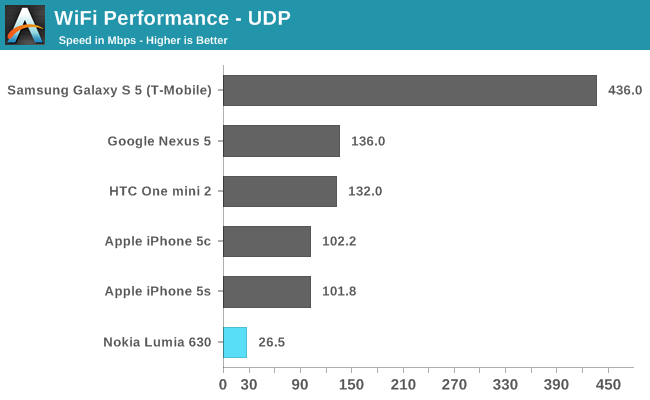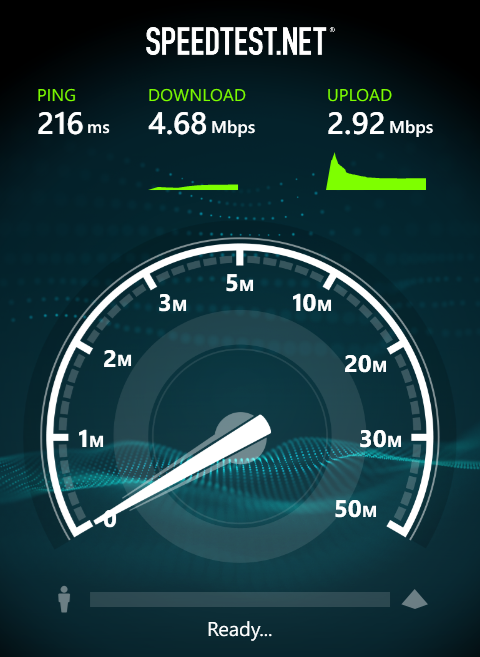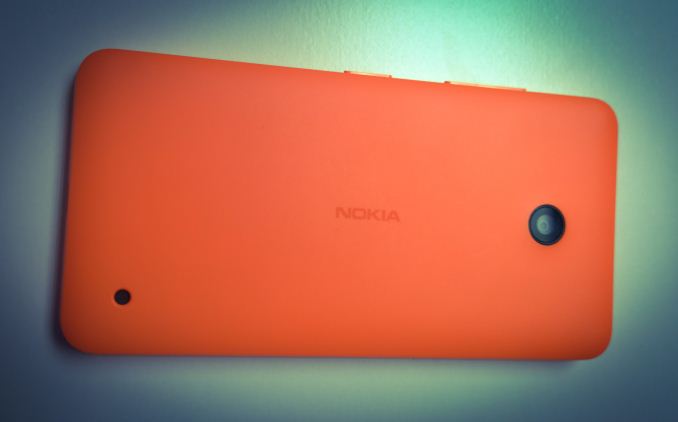Nokia Lumia 630 Review
by Brett Howse on July 22, 2014 8:00 AM EST- Posted in
- Smartphones
- Microsoft
- Nokia
- Mobile
- windows phone
WiFi
The Wi-Fi department is decidedly lacking, with the Lumia 630 only supporting 802.11b/g/n, and only on the 2.4 GHz bands. While I personally prefer the range 2.4 GHz gives me, people in more congested areas have come to rely on 5 GHz for quality connections. It’s not surprising that this is cut it seems to be one of the first things to go once budgets are looked at. For the budget, I can understand why it was done.

Once again we’re bumping into the easy to cull features on an affordable smartphone. While the Lumia 630 is 802.11n, it has a single 2.4 GHz antennae which results in connection speeds that max out at 65 Mbps. With overhead, I have yet to see sustained speeds of over around 27 Mbps, though I’ve seen the occasional peak speeds of around 40 Mbps. Certainly not great but it gets the job done I suppose.
Cellular
The Lumia 630 utilizes the Qualcomm MSM8226 SoC, and is therefore limited to 21.1 Mbps HSPA+ speeds. If you want LTE, you need to go with the Lumia 635 which uses the MSM8926. The 8226 is definitely a known part at this point, with it being the heart of quite a few smartphones including the Moto G. Download speeds are right what you’d expect for a HSPA+ device. As always, these numbers are skewed by the current load on whatever cell site you are attached to, so keep that in mind. The theoretical maximum speed is never going to be reached.
GNSS
Again, with the Qualcomm silicon at the heart of this device, we’re working with well known, and well tested parts such as the GNSS. The Lumia 630 supports Cellular and Wi-Fi assist and supports GPS, GLONASS, and BeiDou for location, and it locks quickly. Hopefully the days of poor location tracking are over.
Speaker
With just a single speaker on the back of the device, the Lumia 630 is not great for playing music. The quality of the sound is typical of most smartphones – tinny and very low dynamic range. The overall volume is decent though, assuming the speaker isn’t covered by your hand, which it normally would not be with the placement of the speaker grille.
For notifications, the speaker is adequate and provides ample volume so that you won’t miss a call or notification. The same can’t be said of the vibration mechanism. It’s too weak, and if the phone is on vibrate and in your pocket, it is very easy to miss a notification.












83 Comments
View All Comments
kyuu - Tuesday, July 22, 2014 - link
Maybe the app, but there's no way for them to prevent you from using Google search in general.Regardless, who cares? Use Bing.
skiboysteve - Tuesday, July 22, 2014 - link
using google search on a windows phone is a really bad idea. I'm glad they got rid of this option. The bing integration is absolutely fantastic and has a great, fast, beautiful, and intuitive interface when you hit the 'search' button.plus if you sign up for bing rewards, simply using your phone for a month gives you enough points for free gift cards
Cerb - Wednesday, July 23, 2014 - link
What exactly is integration of search good for, compared to any other searching?skiboysteve - Thursday, July 24, 2014 - link
Why do we even have apps instead of going to mobile websites? Same thingCerb - Saturday, July 26, 2014 - link
That doesn't make any sense to me, either, when there is a website to use. My phone is quite capable of using most desktop website versions, and doing so is typically much quicker and easier than trying to deal with app, or a mobile site (crazy cluttered sites, like IMDB, are exceptions, but luckily, they aren't the norm).tuxRoller - Wednesday, July 30, 2014 - link
This is sort of how fxos works, and, since the browser engine is always running, starting those apps should be quite fast.If you look at eideticker (the fxos performance tool/dashboard) you can see startup times for various "apps". Even on low end hardware they're pretty good (and the nightlies are so much faster still).
1d107 - Tuesday, July 22, 2014 - link
T-Mobile version, Lumia 635, has LTE and internet sharing with Wi-Fi devices. Would be nice to get speed tests for it. Is there any difference in other features between 630 and 635?On the other hand, for a slightly higher price, a two-year old old HTC 8X has a lot more features, while being nearly the same size and weight.
Brett Howse - Tuesday, July 22, 2014 - link
The 635 is identical except for the SoC which is the MSM8926 which supports LTE, but has the same quad-core Cortex A7 and Adreno 305 GPU.SydneyBlue120d - Tuesday, July 22, 2014 - link
Do You plan to do a review of the Nokia 930 too? Thanks.frostyfiredude - Wednesday, July 23, 2014 - link
This I'd be interested in, I'm semi looking at it for my next phone. My HTC 8X is nearing it's end so it's looking like a good replacement right now.So close to a potential 64-bit and 20nm FinFET release makes me question it though, for the sake of future proofing going 32-bit today seems iffy.